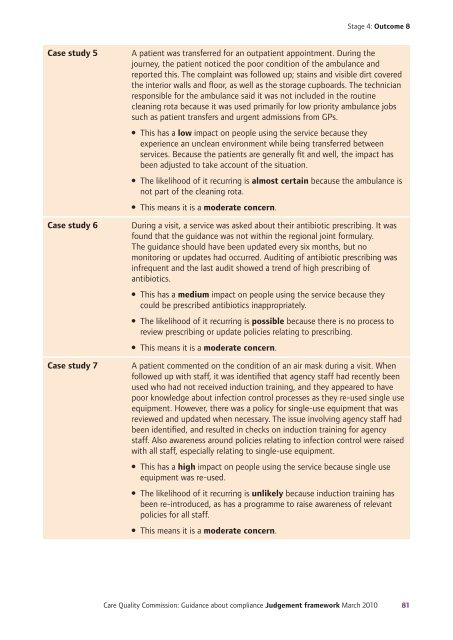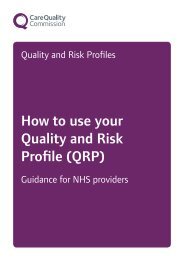Judgement framework - Care Quality Commission
Judgement framework - Care Quality Commission
Judgement framework - Care Quality Commission
You also want an ePaper? Increase the reach of your titles
YUMPU automatically turns print PDFs into web optimized ePapers that Google loves.
Stage 4: Outcome 8<br />
Case study 5<br />
Case study 6<br />
Case study 7<br />
A patient was transferred for an outpatient appointment. During the<br />
journey, the patient noticed the poor condition of the ambulance and<br />
reported this. The complaint was followed up; stains and visible dirt covered<br />
the interior walls and floor, as well as the storage cupboards. The technician<br />
responsible for the ambulance said it was not included in the routine<br />
cleaning rota because it was used primarily for low priority ambulance jobs<br />
such as patient transfers and urgent admissions from GPs.<br />
●<br />
●<br />
●<br />
This has a low impact on people using the service because they<br />
experience an unclean environment while being transferred between<br />
services. Because the patients are generally fit and well, the impact has<br />
been adjusted to take account of the situation.<br />
The likelihood of it recurring is almost certain because the ambulance is<br />
not part of the cleaning rota.<br />
This means it is a moderate concern.<br />
During a visit, a service was asked about their antibiotic prescribing. It was<br />
found that the guidance was not within the regional joint formulary.<br />
The guidance should have been updated every six months, but no<br />
monitoring or updates had occurred. Auditing of antibiotic prescribing was<br />
infrequent and the last audit showed a trend of high prescribing of<br />
antibiotics.<br />
●<br />
●<br />
●<br />
This has a medium impact on people using the service because they<br />
could be prescribed antibiotics inappropriately.<br />
The likelihood of it recurring is possible because there is no process to<br />
review prescribing or update policies relating to prescribing.<br />
This means it is a moderate concern.<br />
A patient commented on the condition of an air mask during a visit. When<br />
followed up with staff, it was identified that agency staff had recently been<br />
used who had not received induction training, and they appeared to have<br />
poor knowledge about infection control processes as they re-used single use<br />
equipment. However, there was a policy for single-use equipment that was<br />
reviewed and updated when necessary. The issue involving agency staff had<br />
been identified, and resulted in checks on induction training for agency<br />
staff. Also awareness around policies relating to infection control were raised<br />
with all staff, especially relating to single-use equipment.<br />
●<br />
●<br />
●<br />
This has a high impact on people using the service because single use<br />
equipment was re-used.<br />
The likelihood of it recurring is unlikely because induction training has<br />
been re-introduced, as has a programme to raise awareness of relevant<br />
policies for all staff.<br />
This means it is a moderate concern.<br />
<strong>Care</strong> <strong>Quality</strong> <strong>Commission</strong>: Guidance about compliance <strong>Judgement</strong> <strong>framework</strong> March 2010<br />
81



